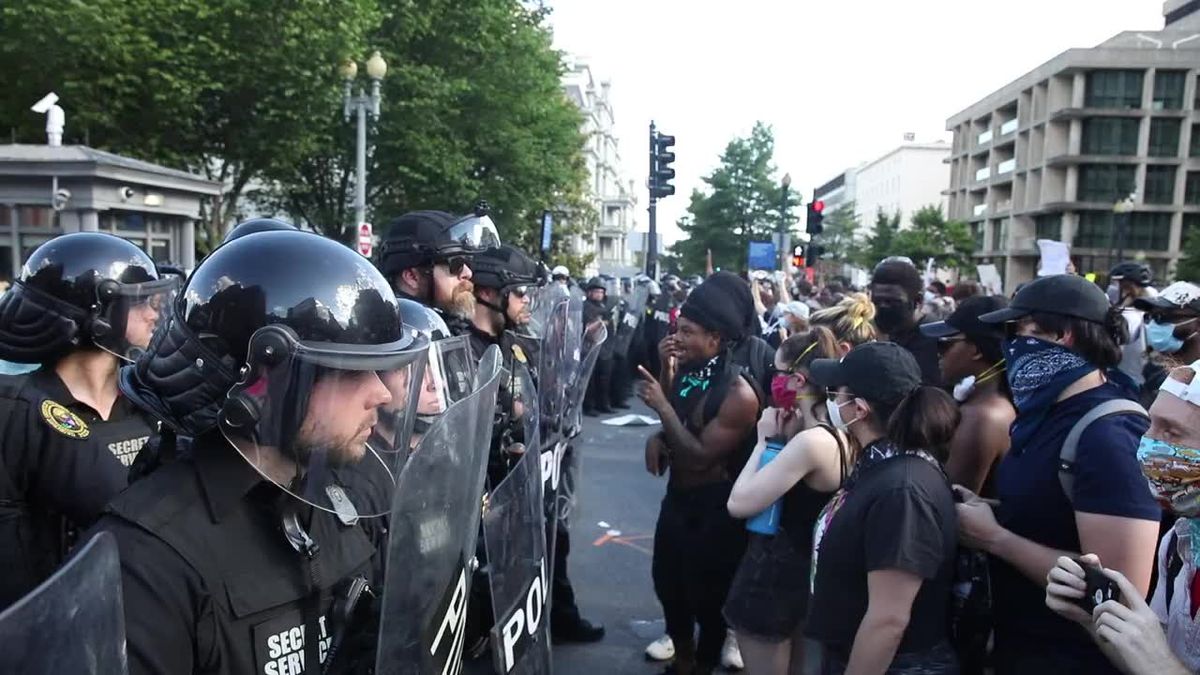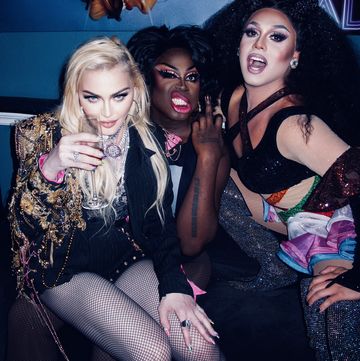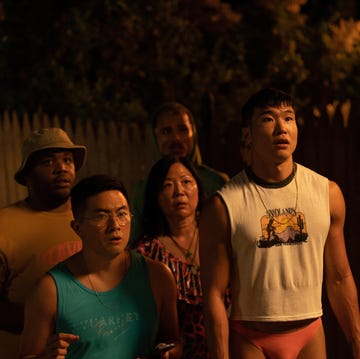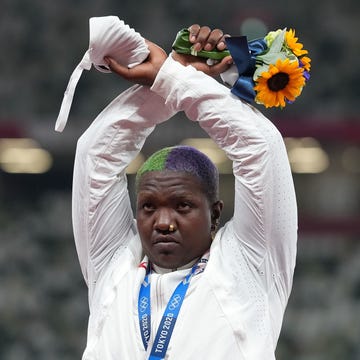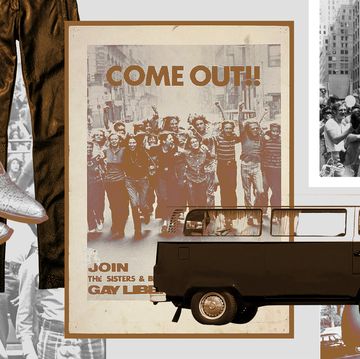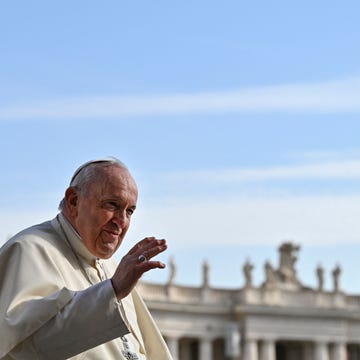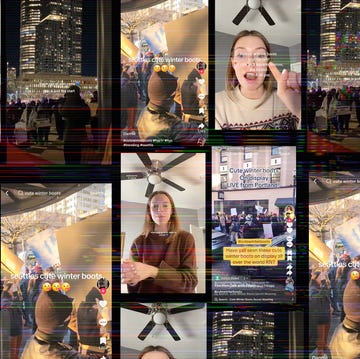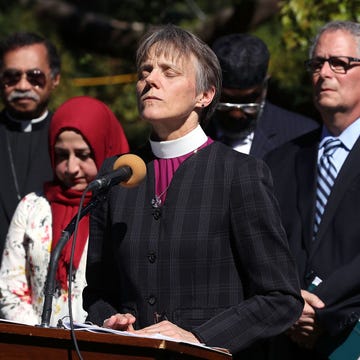On May 25, 2020, Minneapolis police killed George Floyd, igniting a wave of protests for racial justice across America and beyond. Two years later, we're looking back with Pride & Protest, a package of stories about activism, the Black Lives matter movement, and the fight to change the world.
The world changed forever after George Floyd was brutally murdered by a police officer in Minneapolis. Footage of the lynching, which was filmed on a phone by a bystander, went viral. Millions watched in horror as Floyd had the life squeezed out of him by Derek Chauvin, who pinned him down with his knee for nine minutes and 29 seconds as his victim cried out for his mother. His death prompted an uprising on an unprecedented scale.
Over 26 million people around the world marched not only in solidarity for the many Black men and women who have been killed at the hands of the police, but also because they too were affected by racism in some form. Tens of thousands joined the Black Lives Matter movement, an organisation that was launched in 2013 after the acquittal of Trayvon Martin’s killer. For those privileged enough not to face racial injustice, Floyd’s murder and the public reckoning that followed meant it was no longer possible to turn a blind eye to its existence. In the UK, racist statues were toppled, heated debates were had about institutional racism and demands were called for changes to be made to the country’s white-washed school curriculum.
Huge strides have been made, but dismantling the deeply-rooted pillars of white supremacy is not an overnight fix. The British government denied that the UK had a problem with institutional racism via its controversial reports, while numerous other Black men and women were killed by the police in the US. There is a lot that hasn’t changed since the statues fell. Many countries, including our own, still have a way to go before finally confronting an uncomfortable history and current reality.
Black Lives Matter co-founder Opal Tometi has been instrumental in ensuring the civil rights movement remains at the forefront. One of most influential human rights leaders of the century according to Time magazine, she is the first woman to receive the International Peace Honor in 2021. We talked to her to find out what has really changed since Floyd’s murder, what still needs to be done to eliminate racism and how his name should be remembered in history.
To what extent has the murder of George Floyd helped in terms of eradicating racism?
This might be hard to hear, but not much has changed in terms of racism. Racism is a set of ideas about the value of Black people, so it can’t be resolved over one horrifying, tragic incident. It might illuminate it, but it cannot remedy the problem entirely. The way in which George Floyd died—a police officer slowly crushing the life out of him—was symbolic of the torture and inequality experienced by Black people who routinely have the life snuffed out of them, both literally and metaphorically, while people are watching. There is still no substantial or real intervention to prevent this from happening again.
What positive change has happened since his death?
Floyd’s murder has not yet created answers, but it has shone a light on a global human rights issue. This extremely sad event prompted millions of people round the world to say 'enough.' People were appalled and fed-up. They didn’t want to be a bystander; they didn’t want to be an onlooker. They didn’t want to feel as if they had no say about what’s happening in the world. They didn’t want to feel as though they were living in a past time where lynchings happen in plain view. People have been moved to action. That has come as a result—and it’s important.
The truth of the matter is that people have always risen up. Black Lives Matter started eight years ago, but prior to that, numerous other Black organizations have fought racism in a dedicated, committed way. Even before then, we know that there have been thousands of civil rights leaders and activists, along with our ancestors and forefathers, who have been doing the work for a long time. What is new is the scale of it; the Black Lives Matter movement is the largest movement in history globally. It’s a testament to the fact that people still have a conscience and are still moved to act courageously. We’re not cowards.
What has surprised you the most?
I didn’t expect the kind of uprising, I didn’t expect people from all round the world to join us not just out of solidarity, but because they too were affected by racism in their own countries. Black people marched globally to show that racism affected their daily lives. It made white people, from South Africa to the UK, question how their specific context makes them complicit in anti-Black racism. People paused to think about how racism affects all of us, no matter where we live. I have been moved by the scale and reach of this movement, which I never thought was possible.
What does racism look like now?
Racism doesn’t look one way. Just because racism in your country doesn’t look like it does in the US, it doesn’t mean it’s not there. I would say though that police brutality exists everywhere – it just depends on whether you choose to see it. I look at France, Germany and the UK and the ghettoisation of the refugee and immigrant community, which is draconian and horrific. It might not look like the US, but the impact is similar; people are still dying, they might have a poor quality of life, children might be missing family members.
Of all the responses to George Floyd’s death, which have affected you the most personally?
I’ve been moved by people who have made pragmatic, tangible changes to fight racial injustice—people like the fashion designer Aurora James and her 15 Percent Pledge campaign. Black people in the US make up 15 per cent of the population, so she’s challenged major retailers to commit to a minimum of 15 per cent of their shelves to Black-owned businesses, building a non-profit organisation to address a systemic issue. She didn’t just call out the problem, she provided a very concrete solution.
I feel moved by the End Sars movement, Nigeria’s own uprising to confront police brutality that stems from poor government and disdain for poverty. We could finally hear what the people of Nigeria were saying because we were finally having these conversations on a global stage.
I love knowing that young kids are finally able to say that Black Lives Matter. I love seeing them at protests, I love that there are now more books and TV shows with people who look like them. There is more diversity in terms of content that we’re able to consume and engage with. The past 12 months have changed viewpoints for the young and old. I’ve recently reconnected with an 80-year-old white Republican friend whom I’ve known for a long time. He reached out because he could finally see, though the movement, that Trump is a racist and a bigot. He is now an ally and wants to use his power and privilege to drive change. Being reminded of allies in surprising places has been such a great thing.
How should we look at the conviction of Derek Chauvin? What is needed for true justice?
That was about accountability, not justice. Derek Chauvin was held accountable for his actions in a system that is still flawed. What is required for justice is very different, it requires whole transformation around our society. How do we ensure that Black people never experience this type of degradation, harassment, bullying and the devaluation of our lives ever again? We can’t be treated as disposable, like George Floyd was. We need laws that protect us, but also policies that invest in our communities that have been systematically disenfranchised for generations. Twelve months on, this still hasn’t been done. We have to acknowledge the history of this country; we know about slavery, we know about housing discrimination, police brutality and workplace racism, so let’s be honest and create policies that address those issues. We also need policies that undo the damage and begin to repair the harm done. You can’t leave a wound open, you have to heal it.
Will the events of 2020 do anything in preventing future police brutality?
I hope it will, but people have to organize—we can’t let up on that. Things might not be in the news in the same way; it might not have the same cachet or be trending anymore, but we have to stay focused and disciplined. We need see those goals across the finish line, and we won’t get there if we don’t participate. People must stay the course. Please don’t log off.
How should we remember George Floyd? How should we honour him—and the many other Black men and women who have been killed at the hands of racism?
George Floyd has changed the world and we should remember him as somebody who should still be with us. Although he isn’t, his murder should not be in vain. That is a mandate that most people have adopted in some way shape or form—we have each related that to the way we live. We should remember his name as synonymous with the fight for human rights, a name that is tantamount to the ongoing battle for human dignity for Black people around the world.
This piece was originally published in May 2021.

